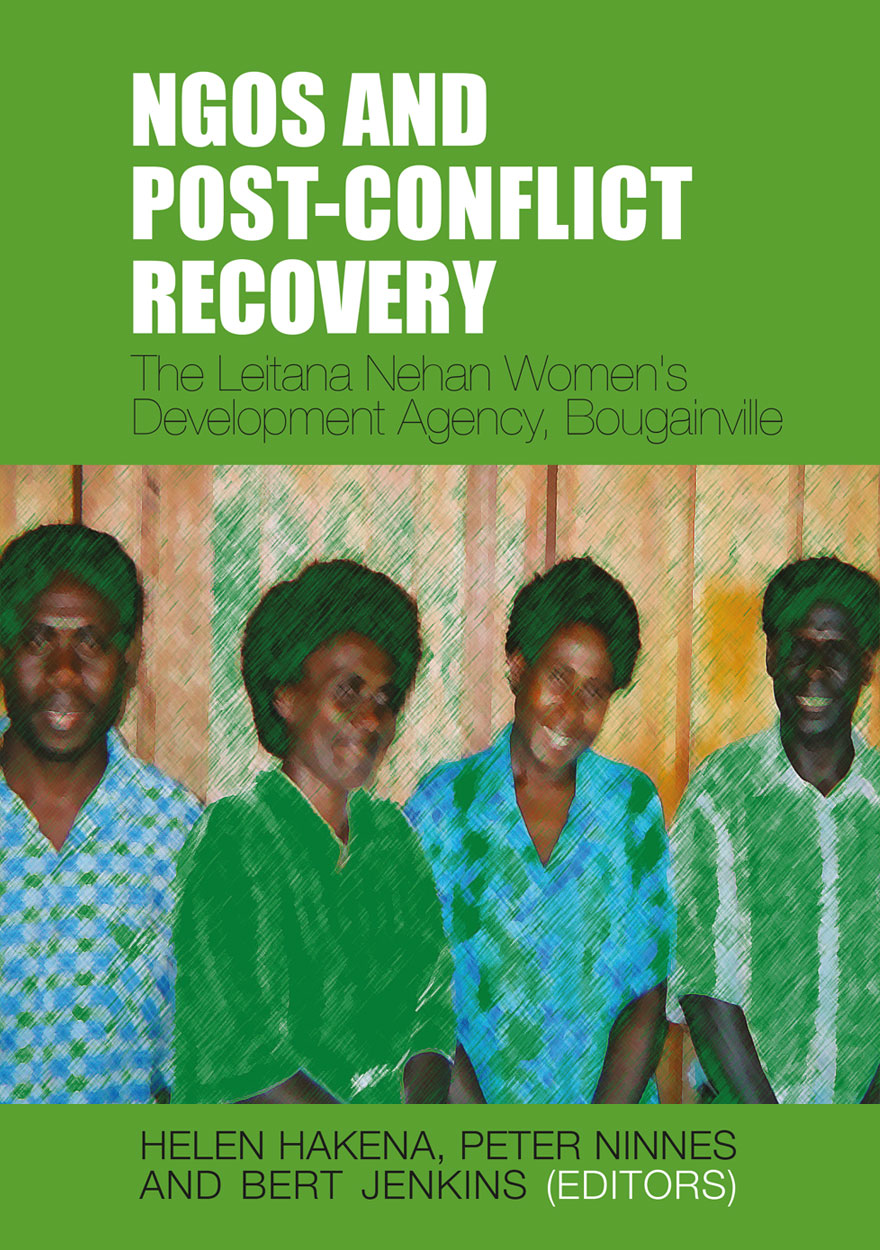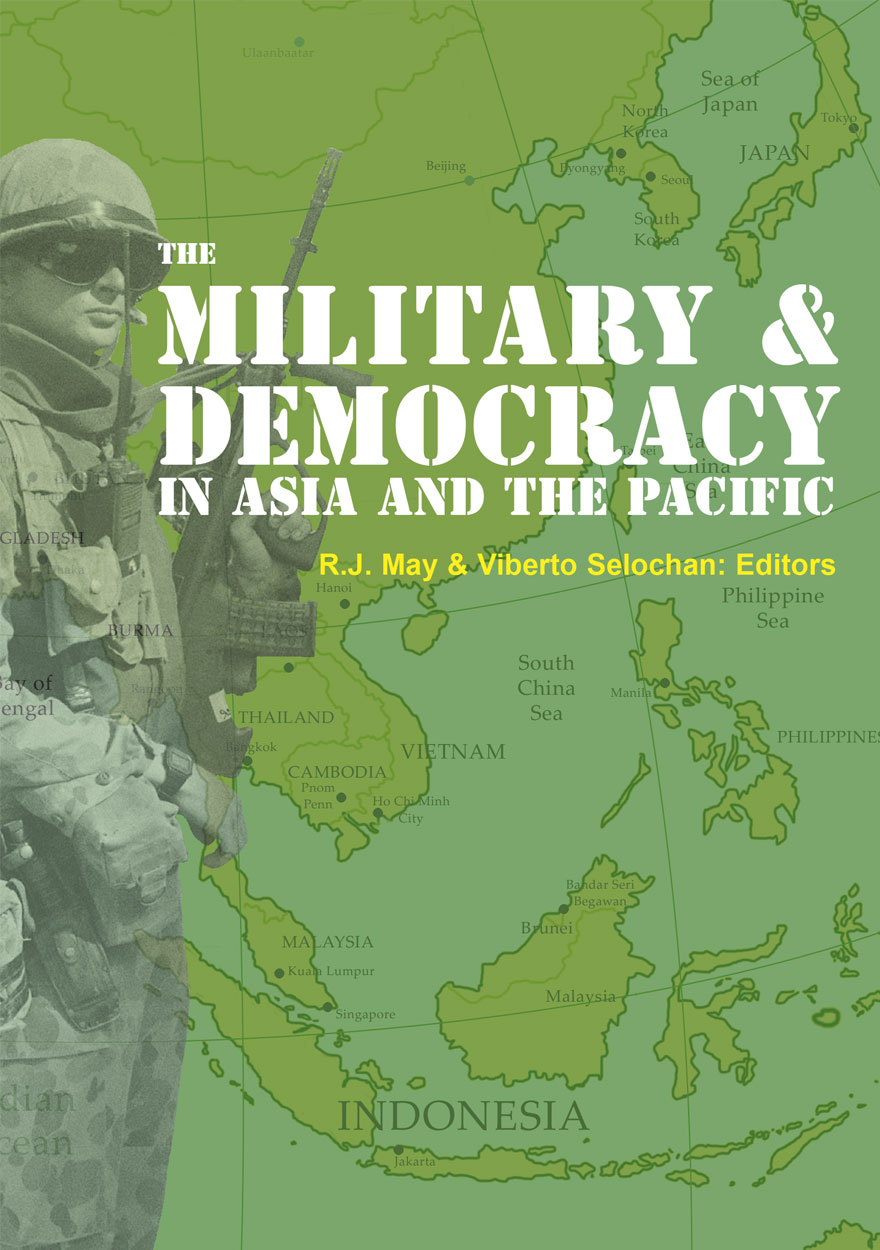Search titles
Displaying results 71 to 78 of 78.

NGOs and Post-Conflict Recovery »
The Leitana Nehan Women’s Development Agency, Bougainville
Edited by: Helen Hakena, Peter Ninnes, Bert Jenkins
Publication date: April 2006
When government services have broken down or when international nongovernment organisations are uninterested or unable to help, grassroots non-government organisations provide important humanitarian, educational and advocacy services. Yet, too often the story of the crucial role played by these organisations in conflict and post-conflict recovery goes unheard.
The Leitana Nehan Women’s Development Agency provides many salutary lessons for grassroots non-government organisations undertaking peacemaking and peace-building work. In the thirteen years of its existence, it has contributed humanitarian assistance, provided education programs on peace, gender issues and community development, and has become a powerful advocate for women’s and children’s rights at all levels of society. Its work has been recognised through the award of a United Nations’ Millennium Peace Price in 2000 and a Pacific Peace Prize in 2004.
This book makes a unique contribution to understanding the role of nongovernment organisations in promoting peace and development and gender issues in the South West Pacific.

Rule of Law, Legitimate Governance & Development in the Pacific »
Authored by: Iutisone Salevao
Publication date: December 2005
The notion that the rule of law embodies or guarantees all the essential requirements for a perfectly just society is extravagant and naïve. Nonetheless, the rule of law remains an essential human virtue whose usefulness the world has yet to outgrow. Using the rule of law as a mobilising theme, this book recasts Western theories of law, good governance and development in a Pacific perspective. While Iutisone Salevao works primarily within a legal analytical framework, he employs a multifaceted approach to address the challenge of making Western theories relevant to the concrete and normative contexts of the Pacific peoples, and to accommodate Pacific values, ideologies, structures and practices within the modern discourse on law.

Pacific Islands Regional Integration and Governance »
Edited by: Satish Chand
Publication date: November 2005
This book brings together experts from around the world to consider specific issues pertaining to regional integration and governance within small states. The authors collectively address the challenges posed to small states by the quickened pace of globalisation. The lessons learnt from the experiences of small states are then used to draw policy lessons for the Pacific island countries.
Pacific Islands Regional Integration and Governance will be of interest and relevance to academics and advanced students of the Pacific, its history and current challenges, as well as the general reader who has an interest in the area.

Pacific Regional Order »
Authored by: Dave Peebles
Publication date: October 2005
The way ahead …
New policies are needed if the Pacific is to realise its potential as a peaceful, prosperous region, where the Pacific’s citizens enjoy good standards of health and education, long lives and many opportunities; where Pacific economic growth is constantly improving, driven by environmentally sustainable service industries; where coups, civil conflict and the dangers of failed states have been relegated to the past; where the Pacific is integrated into the wider region, and is an influential voice in world affairs.
This timely book argues that Pacific countries including Australia, need to embrace regional integration to realise this vision. The book sets out a comprehensive plan for realising a Pacific regional community dedicated to promoting sustainable development, security, human rights, the rule of law and democracy.

Culture and Sustainable Development in the Pacific »
Edited by: Antony Hooper
Publication date: April 2005
Throughout the South Pacific, notions of ‘culture’ and ‘development’ are very much alive—in political debate, the media, sermons, and endless discussions amongst villagers and the urban élites, even in policy reports.
Often the terms are counterposed, and development along with ‘economic rationality’, ‘good governance’ and ‘progress’ is set against culture or ‘custom’, ‘tradition’ and ‘identity’. The decay of custom and impoverishment of culture are often seen as wrought by development, while failures of development are haunted by the notion that they are due, somehow, to the darker, irrational influences of culture.
The problem is to resolve the contradictions between them so as to achieve the greater good—access to material goods, welfare and amenities, ‘modern life’—without the sacrifice of the ‘traditional’ values and institutions that provide material security and sustain diverse social identities.
Resolution is sought in this book by a number of leading writers from the South Pacific including Langi Kavaliku, Epeli Hau’ofa, Marshall Sahlins, Malama Meleisea, Joeli Veitayaki, and Tarcisius Tara Kabutaulaka. The volume is brought together for UNESCO by Antony Hooper, Professor Emeritus at the University of Auckland. UNESCO experts include Richard Engelhardt, Langi Kavaliku, Russell Marshall, Malama Meleisea, Edna Tait and Mali Voi.

The Military and Democracy in Asia and the Pacific »
Edited by: R.J. May, Viberto Selochan
Publication date: March 2004
In The Military and Democracy in Asia and the Pacific, a number of prominent regional specialists take a fresh look at the military’s changing role in selected countries of Asia and the Pacific, particularly with regard to the countries’ performance against criteria of democratic government.
Indonesia, Thailand, the Philippines, Burma, Pakistan, Bangladesh, South Korea, Fiji and Papua New Guinea all fall under the spotlight as the authors examine the role which the military has played in bringing about changes of political regime, and in resisting pressures for change.
Under the auspices of The Australian National University’s Department of Political and Social Change, Research School of Pacific and Asian Studies, and within the context of the Regime Change and Regime Maintenance in Asia and the Pacific project, the following contributors compiled The Military and Democracy in Asia and the Pacific: Emajuddin Ahamed, Suchit Bunbongkarn, Stephanie Lawson, R. J. May, Hasan-Askari Rizvi, Viberto Selochan, Josef Silverstein, Michael Vatikiotis and Yung Myung Kim. The Military and Democracy in Asia and the Pacific provides a sequel to Viberto Selochan’s earlier collection, The Military, the State, and Development in Asia and the Pacific (1991).

Viet Nam — a Transition Tiger? »
Authored by: Brian Van Arkadie, Raymond Mallon
Publication date: January 2004
Viet Nam has seen consistent rapid economic growth and impressive declines in poverty since it initiated its Doi Moi economic reforms in the late 1980s. Viet Nam has taken a selective, step-by-step approach to reform—an approach often criticised by proponents of the Washington Consensus. That this approach has been so successful has come as something of a surprise to much of the international community.
Analysing closely aspects of Viet Nam’s reform process, enterprise development, income growth and poverty alleviation, Viet Nam: a transition tiger? argues that Viet Nam’s remarkable development is not readily explained by the more orthodox versions of the Washington Consensus. Successful policy is not built on mechanistic replication of some general reform blueprint, but on responding pragmatically to specific national circumstances. Government policy has had an impact on economic performance but economic experience has also guided the formulation of economic policy. Faced with increasingly complex economic conditions, Vietnamese policymakers will need to rely more than ever on their flexibility and pragmatism if Viet Nam’s remarkable economic performance is to be sustained.

Out of the Ashes »
Destruction and Reconstruction of East Timor
Edited by: James J. Fox, Dionisio Babo Soares
Publication date: November 2003
Out of the Ashes is a collection of essays that examine the historical background to developments in East Timor and provide political analysis on the initial reconstruction stage in the country’s transition to independence. The volume is divided into three thematic sections – background, assessment and reconstruction – bringing together the experiences and knowledge of academic researchers and key participants in the extraordinary events of 1999 and 2000.
After years of Indonesian rule, the people of East Timor voted to reject an offer of autonomy choosing instead independence from Indonesia. This decision enraged pro-integrationist militia who, backed by the Indonesian military, launched a program of violence and destruction against the inhabitants of East Timor. President Habibie eventually agreed to the presence of a United Nations peace-keeping force, but by this stage East Timor had been ravaged by destruction.
The new East Timorese government faced the challenges of the future with an understanding that the successful struggle for independence was both a culmination and a starting point for the new nation. As the events of 1999 recede, many of the issues and challenges highlighted in Out of the Ashes remain of central significance to the future of East Timor. These essays provide essential reading for students and interested observers of the first new nation of the 21st century.



